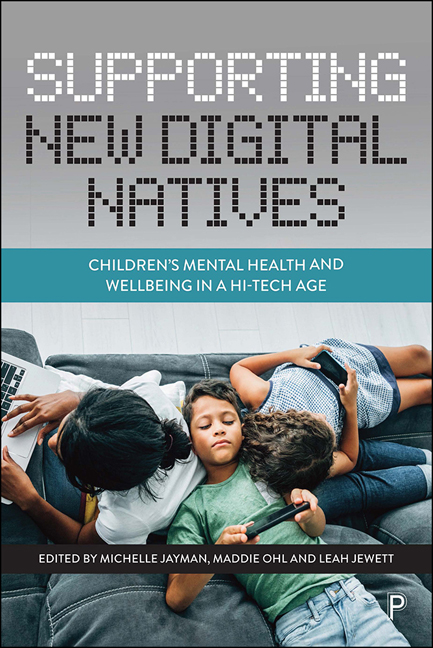Book contents
- Frontmatter
- Dedication
- Contents
- List of figures and tables
- Glossary
- Notes on contributors
- Foreword
- Preface
- 1 Digital lives: growing up in a hi-tech world and staying mentally healthy
- 2 Pyramid Club: building skills for healthy friendships and relationships in a digital age
- 3 Supporting children’s healthy socio-emotional development through play: Book of Beasties – the mental wellness card game
- 4 The School Counselling Partnership: providing support and promoting self-care for school communities
- 5 The Breeze Project: supporting children and young people through Forest School
- 6 Promoting the mental health of girls and young women in the community: the role of Girlguiding
- 7 Supporting families to navigate the changing sex-education landscape: Outspoken Sex Ed
- 8 The Lift Off programme by Red Balloon: online learning and wellbeing support for children who self-exclude from school
- 9 The LifeMosaic project: supporting wellbeing and empowering pupils through design, development and research
- 10 Building better mental wellbeing for children: rebel thinking and innovative practice
- Index
4 - The School Counselling Partnership: providing support and promoting self-care for school communities
Published online by Cambridge University Press: 13 May 2022
- Frontmatter
- Dedication
- Contents
- List of figures and tables
- Glossary
- Notes on contributors
- Foreword
- Preface
- 1 Digital lives: growing up in a hi-tech world and staying mentally healthy
- 2 Pyramid Club: building skills for healthy friendships and relationships in a digital age
- 3 Supporting children’s healthy socio-emotional development through play: Book of Beasties – the mental wellness card game
- 4 The School Counselling Partnership: providing support and promoting self-care for school communities
- 5 The Breeze Project: supporting children and young people through Forest School
- 6 Promoting the mental health of girls and young women in the community: the role of Girlguiding
- 7 Supporting families to navigate the changing sex-education landscape: Outspoken Sex Ed
- 8 The Lift Off programme by Red Balloon: online learning and wellbeing support for children who self-exclude from school
- 9 The LifeMosaic project: supporting wellbeing and empowering pupils through design, development and research
- 10 Building better mental wellbeing for children: rebel thinking and innovative practice
- Index
Summary
The provision of counselling support in primary and secondary schools in the United Kingdom has increased exponentially since the 2000s. A report by Place2Be and the National Association of Head Teachers (NAHT, 2020) identified that between 2016 and 2019 school-based counselling support had risen from 36 to 66 per cent. This increased capacity in schools was a strategic response to the widely reported rise in psychological distress in both children and young people (CYP) (NHS Digital, 2018; The Children's Society, 2020), and is grounded in the belief that schools are best placed to deliver mental health and wellbeing support (Mackenzie and Williams, 2018). One provider, the School Counselling Partnership (SCP), is a locally developed service that delivers to both primary and secondary schools across London and is the focus of this chapter.
School counselling for 21st-century learners
The expansion of counselling services in schools has seen a concurrent rise in the use of virtual and digital modes of delivery. A review by the Early Intervention Foundation (EIF) (Wilson and Waddell, 2020) suggests that some interventions for CYP are being successfully implemented using online interfaces, including mental health and wellbeing programmes. This style of delivery would appear highly desirable to a generation of new digital natives who are already comfortable and conversant with online activities in other areas of their lives. However, the EIF's review of 21 virtual and digital mental health and wellbeing interventions urges caution in assuming CYP's inevitable engagement and reduced attrition (Wilson and Waddell, 2020). The online interventions that reported the strongest impact on CYP were those that adopted a cognitive behavioural therapy (CBT) technique (Grist et al, 2019). Through CBT, CYP are guided to rehearse adaptive behaviours to deal with, for example, anxiety or depression and to replace negative cognitions with positive ones. Specifically, internet-based cognitive behavioural therapy (ICBT) for youth anxiety is more developed than online treatments for other mental health problems (Pennant et al, 2015), while evidence suggests that higher levels of engagement are associated with programmes guided by a therapist, either virtual or real (Sauter et al, 2009; Beidas et al, 2014). This aligns with the EIF's findings which highlight the value of the practitioner–participant relationship in ensuring that CYP who participate in online interventions persist with the programme (Wilson and Waddell, 2020).
- Type
- Chapter
- Information
- Supporting New Digital NativesChildren's Mental Health and Wellbeing in a Hi-Tech Age, pp. 60 - 77Publisher: Bristol University PressPrint publication year: 2021

